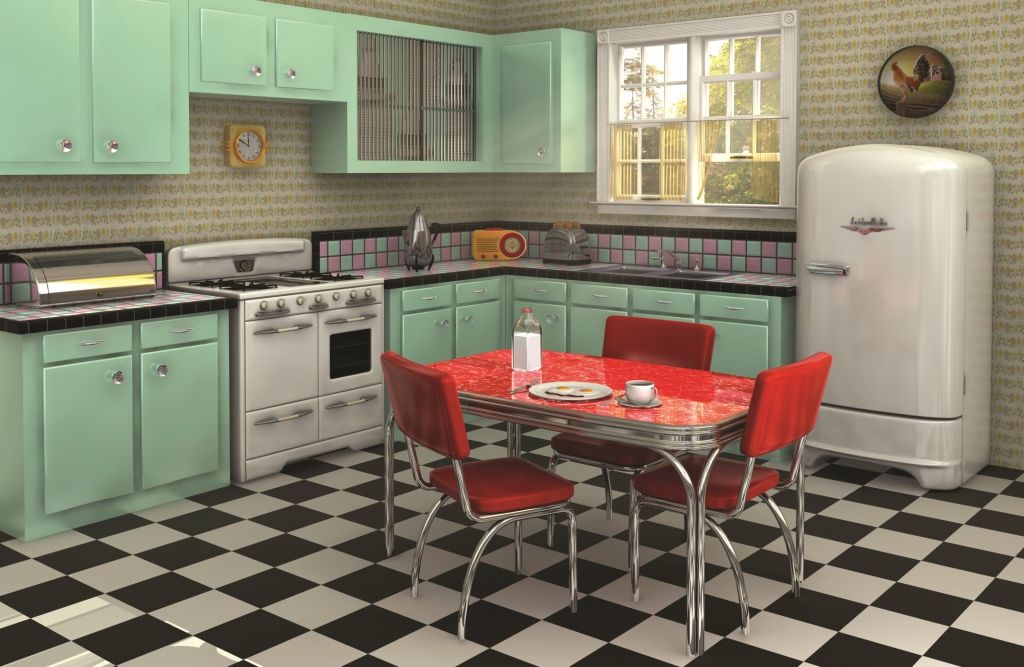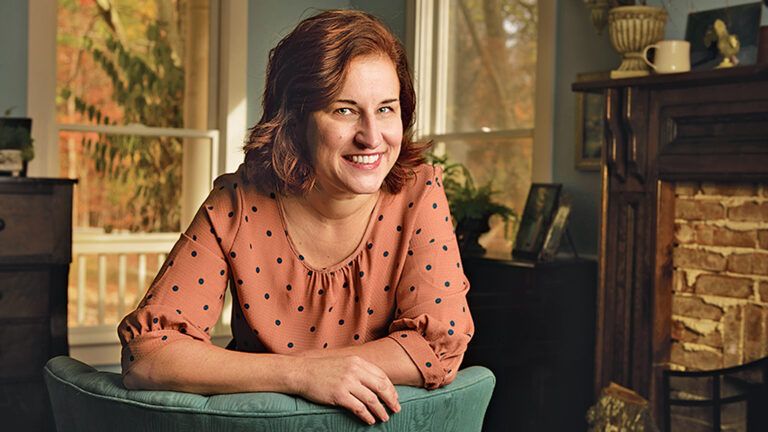Not too long ago I was wandering through the Detroit Historical Museum’s collection of 20th-century furniture and housewares and was surprised to come upon a red metal-topped table that was set up in a ’50s-style kitchen. Similar to the one we had, I thought. How odd to see a part of my childhood in a museum! I couldn’t help thinking back four decades.
“Dinner is 5:05 sharp,” Mom would call after us kids as we left for the park. But there was no need for a reminder. A little before five one of us would yell, “Let’s get Dad!”
We’d jump on our bikes and tear up the street to greet our father when he got off work at the factory. Once home, Dad kissed Mom, traded his shoes for slippers and summoned any stragglers to the table. Then he led us in grace.
We had a regular seating arrangement. Fred and I shared a two-seat bench, with Sherry in a chair next to me. Dave and Paul were across from us, and Mom and Dad at either end. We made room for new members, who joined the table in high chairs: Bob first, and a few years later the twins, Elizabeth and Marissa. There was always laughter at supper. Once, the Blessed Mother planter fell on Paul’s head. Another time the stereo caught fire. Dad joked about both incidents: “The Blessed Mother was trying to get Paul’s attention,” he said, smiling slyly. “That Elvis was so hot his ‘Hound Dog’ ignited our stereo.”
By the mid ’60s, some of the tablemates had given up their spots: Sherry married and moved to Hawaii; Paul was stationed at Belle Isle Army Base; Dave got sent to Vietnam; Fred enrolled in a Detroit seminary. That’s when our table became our communications nexus.
After supper Dad would read aloud letters from our absent siblings. If there was a picture in the envelope, it was passed around. Mom would hold the photo up for Bob and the twins to see. “Look at your brother David,” she’d say. “Here he is having a cookout with his Army friends.”
It was almost as if the entire family were together again. At the time, every night after dinner the TV showed grisly footage from the Vietnam war. Our nation was in turmoil. Just a high-school senior, I felt like I was in turmoil, too. I was drifting away from the lessons my parents had taught me about trust and faith. Lessons I had learned around our kitchen table.
One warm summer evening in 1971, I asked some girlfriends to take a ride with me in my ’65 yellow Mustang. It was a fad then to decorate your bedroom walls with road signs, and I brought up the idea to steal some. Everyone thought it’d be fun. We had just pulled down a stop sign when a police car raced up, lights flashing.
The officer had us replace the sign, then hauled us in to the station. “I’m so sorry, sir. Please don’t call my dad,” I begged. My plea fell on deaf ears. I got home late. Dad was still awake, sitting in the darkened living room. “Dad,” I began, “let me explain….” He cut me short. “Go to bed. We’ll discuss it in the morning.” I didn’t sleep a wink that night, and at seven the next morning I was at the table before Dad, biting my nails.
When I couldn’t stand waiting anymore, I went to find him. My parents’ bedroom door was ajar. I peeped in, and there Dad was, kneeling beside the bed, praying. I’d never seen that before. I’d seen him pray every Sunday in church, of course. But this was different. I knew he was praying about what I’d done, and it made me feel terrible to think he was talking to God about what to do with me. I went back to the kitchen, and finally Dad joined me. “Here,” I said, sliding my car keys across the table to him. “I don’t deserve your trust.” I looked at the clock. “I probably should leave to catch the school bus.”
“Wait, Marilyn,” Dad said. He motioned for me to sit down. “The police officer said you took full responsibility for everything last night, that you admitted leading your friends along. Is that true?” “Yes, it’s true.” “That took character,” he said. “I’m proud you’re my daughter.”
He slid the keys back to me. The tabletop felt smooth under my fingers as I grasped my key ring. His hand covered mine and squeezed. Then he was out the door, lunch pail in hand.
As I stood before the museum exhibit all those years later I brushed away a tear. You’re crying over a table, for Pete’s sake! I chided myself, though I knew it wasn’t actually our table that had held us all together. It was love that bound us, especially as we sat there at mealtimes, eating, laughing, arguing–together as a family, the way God intended.




